

Tollec Bernard
Strenghts based consultant and coach (Appreciative Inquiry)
Appreciative Inquiry - Un site utilisant WordPress. Strength based organizations. La puissance des organisations qui se basent sur leurs forces. Summits Blog. Jason Mitchell is the head of the Social Cognitive and Affective Neuroscience Lab at Harvard University.
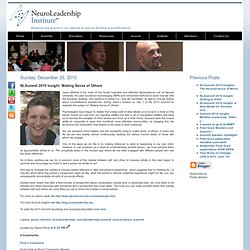
He uses functional neuroimaging (fMRI) and behavioral methods to study how we infer the thoughts, feelings, and opinions of others (i.e., how we mentalize), as well as how we reason about counterfactual experiences. During Jason’s session on Day 1 of the 2010 Summit he explored the subject of “Making Sense of Others”. Psychologists have begun to realize that a large part of what allows us to be such a force on this planet comes not only from our cognitive abilities but also a set of specialized abilities that allow us to harness the energies of other people and hook up to their minds. Humans have the unique ability to cooperate in ways that contribute more effective communities, by plugging into the know-how and information that resides in the head of each individual. We are veracious mind readers and are constantly trying to make sense of others. For more on Jason's work visit. Sallie Lee & Shared Sun Studio. Paper.li – Be a publisher.
Paper.li - Vous êtes le red-en-chef. HBR by Involve Consulting. Creativity by Involve Consulting. Neuroscience byInvolve Consulting. Leadership by Involve Consulting. Lateral Thinking by Involve. Learning Organizations (Peter Senge) A learning organization is the term given to a company that facilitates the learning of its members and continuously transforms itself.[1] Learning organizations develop as a result of the pressures facing modern organizations and enables them to remain competitive in the business environment.[2] A learning organization has five main features; systems thinking, personal mastery, mental models, shared vision and team learning.[3] The Learning organization concept was coined through the work and research of Peter Senge and his colleagues [4] .
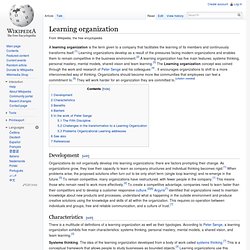
It encourages organizations to shift to a more interconnected way of thinking. Organizations should become more like communities that employees can feel a commitment to.[5] They will work harder for an organization they are committed to. [citation needed] Development[edit] Organizations do not organically develop into learning organizations; there are factors prompting their change. Characteristics[edit] Systems thinking. Personal mastery. Sol France. Society for Organizational Learning.
Appreciative inquiry. According to Gervase R.
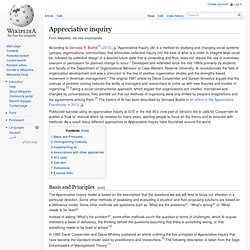
Bushe[1] (2013) "Appreciative Inquiry (AI) is a method for studying and changing social systems (groups, organizations, communities) that advocates collective inquiry into the best of what is in order to imagine what could be, followed by collective design of a desired future state that is compelling and thus, does not require the use of incentives, coercion or persuasion for planned change to occur. " Developed and extended since the mid 1980s primarily by students and faculty of the Department of Organizational Behavior at Case Western Reserve University, AI revolutionized the field of organization development and was a precursor to the rise of positive organization studies and the strengths based movement in American management.
" Basis and Principles[edit] The Appreciative Inquiry model is based on the assumption that the questions we ask will tend to focus our attention in a particular direction. Instead of asking “What’s the problem?” Appreciative Living. You’re listening to Jackie Kelm’s Sirius Satellite XM radio interview on the “Fully Alive” Show with Dr.
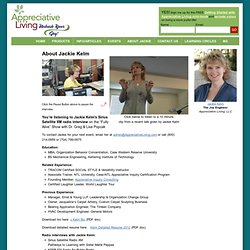
Greg & Lisa Popcak To contact Jackie for your next event, email her at admin@AppreciativeLiving.com or call (800) 214-0959 or (704) 799-0975. Education: MBA, Organization Behavior Concentration, Case Western Reserve UniversityBS Mechanical Engineering, Kettering Institute of Technology Related Experience: TRACOM Certified SOCIAL STYLE & Versatility InstructorAssociate Trainer, NTL University, Case-NTL Appreciative Inquiry Certification ProgramFounding Member, Appreciative Inquiry ConsultingCertified Laughter Leader, World Laughter Tour. The European network around Appreciative Inquiry and Strength Based Change. Gervase Bushe. Gervase Bushe (pronounced Jervis Bush) has 30 years of experience in a wide range of organizational change and development projects.
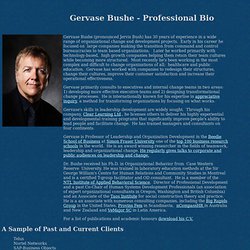
Early in his career he focused on large companies making the transition from command and control bureaucracies to team based organizations. Later he worked primarily with technology-based, high growth companies helping them retain their team cultures while becoming more structured. Most recently he's been working in the most complex and difficult to change organizations of all: healthcare and public education. Gervase has worked with companies to redesign their structures, change their cultures, improve their customer satisfaction and increase their operational effectiveness. Gervase primarily consults to executives and internal change teams in two areas: 1) developing more effective executive teams and 2) designing transformational change processes.
Gervase's skills in leadership development are widely sought. Dr. Involve Consulting. L’Appreciative Inquiry « Involve Consulting – La performance collective par l'Appreciative Inquiry. Livres sur l’Appreciative Inquiry « Involve Consulting – La performance collective par l'Appreciative Inquiry. La performance Collective avec l'Appreciative Inquiry chez Philips. Un bilan annuel de Philips basé sur les forces de l'organisation. Leadership development Experiential Learning by Involve Consulting.
Business Management Ideas - Harvard Business Review Blogs. Vidéos Pearltrees. Help.